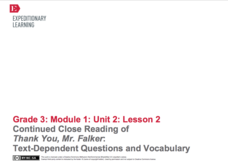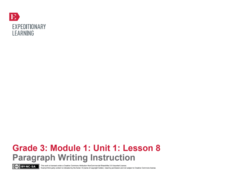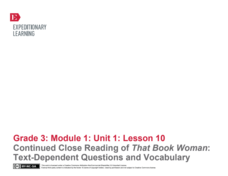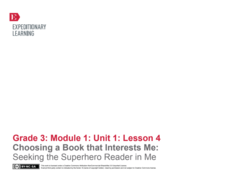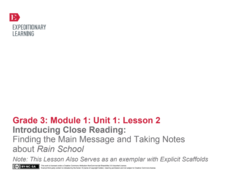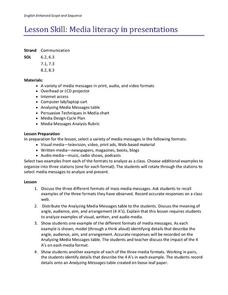Education Outside
Divine Dumplings
In a lesson that combines cooking, language arts, and social studies, learners create a delicious plate of dumplings for everyone to enjoy. After an initial discussion in the opening circle, pupils go to the cooking station and work...
Curated OER
Teaching "A Week in the Woods"
The book, A Week in the Woods is the focus of the very interesting language arts lesson plan presented here. After the book has been read, learners engage in study of certain parts of the book in order to gain a better understanding of...
Curated OER
Bog Child
You are destined for an engaged and happy class as they read Siobhan Dowd’s Bog Child because there is nothing missing from this study guide, seriously. This might be the easiest novel to teach because you don’t have to do a thing in...
Curated OER
The Dust Bowl Odyssey
Great information, images, and wonderful higher-order thinking questions await your class. They'll discuss, consider, and examine multiple factors related to the Dust Bowl. A cross-media comparison is made between the historical events...
Learning to Give
Asian Folktales
A great way to learn to understand people and their environment is to study their folktales. Stories from China, Vietnam, India, Iran, Persia, and Palestine offer an opportunity for readers to investigate the cultures of Asia. A list of...
Shakespeare in American Life
Performing Modernized Shakespeare
“All the world’s a stage…” What do Leonardo DiCaprio, Heath Ledger, and Kenneth Branagh have in common? They have all starred in modern adaptations of Shakespeare’s plays. After viewing a series clips from modern Shakespeare videos,...
Curated OER
Teaching the Holocaust Through Poetry
W.H. Auden’s poem “Refugee Blues” launches a study of the problems of refugees. Background information about the poem and general information about Jewish refugees from Germany and Austria are provided, as are discussion questions and...
EngageNY
Documenting Research: Sorting and Recording Information About the Wheelwright
Fourth graders practice using a graphic organizer to record their notes and answer text-dependent questions while supplying evidence of how they found their answer. They focus on a machine called the wheelright, which was commonly used...
EngageNY
Writing to Inform: Colonial Trades
Fourth graders who are studying life in colonial America engage in an instructional activity that has them create a "Help Wanted" ad that would have been written by a master craftsperson from back in the day. They utilize a graphic...
EngageNY
Continued Close Reading of Thank You, Mr. Falker: Text Dependent Questions and Vocabulary
In the second lesson plan in a series that revolves around the story, Thank You, Mr. Falker, learners practice the skill of answering direct questions from the text while using complete sentences. After a teacher-led review of how to...
EngageNY
Close Reading of Thank You, Mr. Falker: Identifying the Superpowers of Reading
Third graders read excepts from the story, Thank You, Mr. Falker in order to gain practice in understanding an unfamiliar story by focusing on the details. They use a worksheet, embedded in the plan, which directs them to certain...
EngageNY
Close Reading of That Book Woman: How Did People Access Books in Rural Areas of the United States?
For this ninth lesson plan in a larger beginning-of-the-year unit, close reading skills are used independently to find the gist of the story That Book Woman. Rereading for important details is the targeted skill to unlock a deeper...
EngageNY
Paragraph Writing Instruction
Writing a paragraph from details found directly in a text is the central focus of this thorough and explicit lesson plan. Using the stories Nasreen's Secret School and Rain School, third graders are lead step-by-step through the basics...
EngageNY
Continued Close Reading of That Book Woman: Text-Dependent Questions and Vocabulary
Explicitly explained and delightfully detailed are two ways to describe this tenth lesson plan in a larger unit designed for the first few weeks of third grade. Learners continue to use and develop previously learned close reading...
EngageNY
Continued Close Reading of Nasreen's Secret School: Discussions of Questions and Evidence
Third graders answer text-dependent questions of the story Nasreen's Secret School both independently and then collaboratively through using the carousel of questions strategy. This plan is the seventh instructional activity in a larger...
Curated OER
Advertising in the Contemporary World: An Introduction to Persuasive Texts
Beginning a persuasive writing unit with your middle schoolers? Approach it through something that persuades us all: advertising! Through studying video and print advertisement, your class will practice Common Core skills for reading...
Curated OER
Persuasion as Text: Organizational, Grammatical, and Lexical Moves in Barbara Jordan’s "All Together Now"
A thorough lesson on persuasive writing takes middle schoolers through several activities, including group discussion, collaborative posters, and independent writing. They compare historical speeches and analyze the persuasive techniques...
EngageNY
Launching Readers Theater Groups: Identifying Passages from Esperanza Rising for Readers Theater that Connect to the UDHR
Teach young readers how to compare two texts and select passages that exemplify a specific theme with Lesson 6 from Unit 3. Begin by modeling how an expert reader selects examples from a text, performing a think aloud on how Article 2 of...
EngageNY
Choosing a Book That Interests Me: Seeking the Superhero Reader in Me
Selecting a "power book" and engaging in a structured class discussion are the learning targets for this fourth lesson in a larger unit. It is designed as a beginning of the year unit for establishing norms and routines in the classroom....
EngageNY
Continued Close Reading of Rain School: Text-Dependent Questions and Vocabulary
The engaging story Rain School is further explored in the third lesson of a larger unit that explicitly teaches close reading skills by answering questions whose answers can only be found inside the text. Through teacher modeling and...
EngageNY
Introducing Close Reading: Finding the Main Message and Taking Notes About Rain School
This second lesson in a larger unit is perfect for the beginning of the year because it explicitly teaches 3rd graders how to use close reading skills by identifying unfamiliar words, figuring out the gist, and defining important...
The New York Times
Stress Less: Understanding How Your Mind and Body Respond to Anxiety
What could be more relevant to teens and preteens than experiencing stress? Use an article from the New York Times website to practice valuable Common Core skills for informational text reading, and also get a discussion going in your...
Utah Education Network (UEN)
Classical Appeals and War Speeches
Discuss classical appeals of rhetoric through the speeches of Winston Churchill and FDR. Learners read, annotate, and analyze the speeches by the men before using a graphic organizer to track the use of ethos, pathos, and logos.
Curated OER
Media Literacy in Presentations
Middle schoolers study the three types of mass media messages: visual media, written media, and audio media. After a class discussion which has them list examples of each, learners get into pairs and work on analyzing the "Four A's" in...











